Aniston Naked in Haiti
Something’s off here. The Stiller Foundation is real and earnest, and I understand Stiller not wanting to sound overly solemn and sanctified. But the tone of this video implies the whole thing might be a put-on. And with all the talk about “See Jennifer Aniston Naked Foundation…forget it. I’m being too literal.
Incoming
Without disagreeing with the views of The Association of Black Women Historians and MSNBC’s Melissa Harris-Perry about The Help, I still maintain (as will most critics) that Viola Davis‘s performance is strong and stellar. Harris-Perry doesn’t dispute this either. Don’t throw the baby out with the bathwater.
Move
If only director Rick Mereki and his travelling buddy (i.e., the guy in the video) had made sure that the guy wore the same duds every time they shot. Then the effect would be stunning. Learn and Eat are pretty good also.
Seriously?
Another rightwing Christian-yokel Texas governor who has a Supercuts hair style and wears cowboy boots and fat yellow ties over blue shirts, and who talks like a shitkicker and believes in American exceptionalism? The presumption is that Gov. Rick Perry will eventually knock out Bachmann and may even prevail against Romney. (Possibly.) Republicans are actually toying with nominating a guy who’s basically Dubya with modifications?
The Ghoulies
Editor-screenwriter David Scott Smith recently sent me four episodes of Dead Island, a kind of comic video-game component. This led to me wonder if anyone has tried to create a TV or cable series about a family of flesh-eating ghouls called…I don’t know but let’s call them The Munchies. Call it a cross between The Munsters, The Addams Family, True Blood and The Flintstones.
A series about a typical suburban family living in some ghastly tract-home development (or in an upscale trailer park), except they’re zombies who need to occasionally prowl around and eat fresh victims. They could be mindlessly consumptive nouveau riche types living in a zombie McMansion. Most of the neighbors think they’re a quirky, strange-looking family with the gray skin and dead eyes and all, and one or two neighbors are starting to figure out who and what they really are. This sounds like a no-brainer to me. I’m presuming somebody has written a pilot along these lines….but maybe not.
Twenty years ago I tried to write a weekly Hannibal Lecter TV series pilot in which Lecter wanders from town to town and situation to situation like Caine in Kung Fu or Richard Kimble in The Fugitive, getting into inrigues and adventures and helping people with their problems. The stories usually boil down to this or that sympathetic character being victimized or harassed or threatened by some asshole, and Lecter solving things at the end of each episode by killing and eating the victimizer-harasser-threatener. Simple formula. Why didn’t a good screenwriter (i.e., someone unlike myself) as least try this?
I’ve learned over time that if there’s a semi-original idea or a concept I’m excited or intrigued by, the odds are that it won’t fly with producers or studio or network people. Many of my story ideas need to simmer for five or ten or even twenty years before they make sense to others. My Nothing magazine idea — “a series of snide, lighthearted riffs on the notion that glib irony and an increasing absence of sincerity or ‘meaning’ in the arts had virused into a kind of existential fast-food that everyone was consuming” — was hatched in 1979 or ’80, and only now, I think, would people really get it.
Stirrings
Having enough money in the bank and knowing more is on the way in and being able to roll along comfortably within a reasonable framework, paying for this and that and going out to dinner every so often without getting the willies or waking up with sweat and worry at 3:30 am, is a truly peaceful and wonderful thing. I say this as someone who’s been sweating money issues for a long time. Hell, most of my life.
I would be very loath to give up this hard-won feeling of economic assurance. This instinct to guard against any kind of economic relapse and being extra-vigilant about keeping the hull sealed and the fort protected is how amiable, liberal, mild-mannered people start to become conservative fucks. I’ll never be a rightie, but I can see how the process begins.
Hard-To-Love Searchers
I feel nothing but admiration and affection for Peter Bogdanovich, and I’ve been enjoying his Indiewire “Blogdanovich” columns all along. But his 8.9 praise piece about John Ford‘s The Searchers doesn’t feel especially fresh and in fact has a tired pulse. Bogdanovich is a Ford scholar par excellence, of course, but we’ve been hearing this same old stuff about The Searchers for decades (“not only among the very best, but also among the final Western masterworks of the movies’ golden age”). So why re-state it?
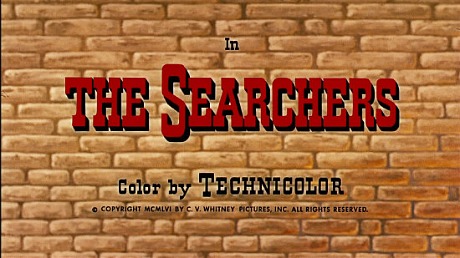
The first significant “take a fresh look at The Searchers” piece was written 32 years ago by New York contributor Stuart Byron. In it he called Ford’s 1956 film the “Super-Cult Movie of the New Hollywood.” And here we still are in the Age of Withered Obama, and The Searchers Bluray is a ripe and luscious thing to have and hold. We get it, we get it. Or I certainly do.
Here’s a counter-punch piece I posted a little more than five years ago:
“John Ford‘s movies have been wowing and infuriating me all my life. A first-rate visual composer and one of Hollywood’s most economical story-tellers bar none, Ford made films that were always rich with complexity, understatements and undercurrents that refused to run in one simple direction.
“Ford’s films are always what they seem to be…until you watch them again and re-reflect, and then they always seem to be about something more.
“But the phoniness and jacked-up sentiment in just about every one of them can be oppressive, and the older Ford got the more he ladled it on.
“The Irish clannishness, the tributes to boozy male camaraderie, the relentless balladeering over the opening credits of 90% of his films, the old-school chauvinism, the racism, the thinly sketched women, the “gallery of supporting players bristling with tedious eccentricity” (as critic David Thomson put it in his Biographical Dictionary of Film) and so on.
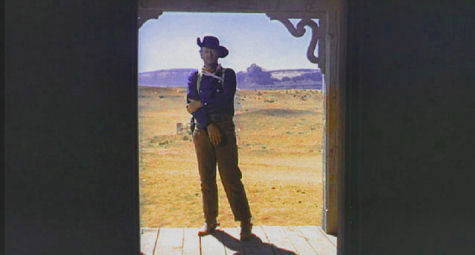
The closing shot of John Ford’s The Searchers
“The treacliness is there but tolerable in Ford’s fine pre-1945 work — The Informer, Stagecoach, Young Mr. Lincoln , Drums Along the Mohawk, They Were Expendable , The Grapes of Wrath and My Darling Clementine .
“But it gets really thick starting with 1948’s Fort Apache and by the time you get to The Searchers, Ford’s undisputed masterpiece that came out in March of 1956, it’s enough to make you yank the reins and go ‘whoa, nelly.’
“Watch the breathtaking beautiful new DVD of The Searchers, and see if you can get through it without choking. Every shot is a visual jewel, but except for John Wayne‘s Ethan Edwards, one of the most fascinating racist bastards of all time, every last character and just about every line in the film feels labored and ungenuine.
“The phoniness gets so pernicious after a while that it seems to nudge this admittedly spellbinding film toward self-parody. Younger people who don’t “get” Ford (and every now and then I think I may be turning into one) have been known to laugh at it.
“Jeffrey Hunter‘s Martin Pawley does nothing but bug his eyes, overact and say stupid exasperating lines all through the damn thing. Nearly every male supporting character in the film does the same. No one has it in them to hold back or play it cool — everyone blurts.
“Ken Curtis‘s Charlie McCorry, Harry Carey Jr.’s Brad Jorgensen, Hank Worden‘s Mose Harper…characters I’ve come to despise.
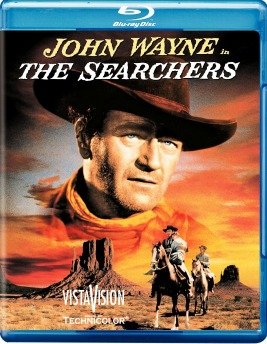
“I’ll always love the way Ford handles that brief bit when Ward Bond‘s Reverend Clayton sees Martha, the wife of Ethan’s brother, stroking Ethan’s overcoat and then barely reacts — perfect — but every time Bond opens his mouth to say something, he bellows like a bull moose.
“You can do little else but sit and grimace through Natalie Wood‘s acting as Debbie (the kidnapped daughter of Ethan’s dead brother), Vera Miles‘ Laurie Jorgenson, and Beulah Archuletta‘s chubby Indian squaw (i.e., “Wild Goose Flying in the Night Sky”)…utterly fake in each and every gesture and utterance.
“I realize there’s a powerful double-track element in the racism that seethes inside Ethan, but until he made Cheyenne Autumn Ford always portrayed Indians — Native Americans — as creepy, vaguely sadistic oddballs. The German-born, blue-eyed Henry Brandon as Scar, the Comanche baddie at the heart of The Searchers…’nuff said.
“That repulsive scene when Ethan and Martin look at four or five babbling Anglo women whose condition was caused, we’re informed, by having been raised by Indians, and some guy says, “Hard to believe they’re white” and Ethan says, “They ain’t white!”
“I don’t know how to enjoy The Searchers any more except by wearing aesthetic blinders — by ignoring all the stuff that drives me up the wall in order to savor the beautiful heartbreaking stuff (the opening and closing shot, Wayne’s look of fear when he senses danger for his brother’s family, his picking up Wood at the finale and saying, ‘Let’s go home, Debbie’).
“All I’m saying is, for a great film it takes an awful lot of work to get through it.”
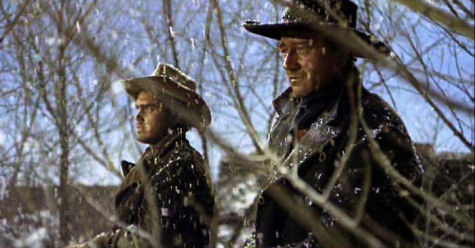
Jeffrey Hunter, John Wayne
Dust and Destruction
This looks like Ian McKellen‘s Richard III (’95) all over again. You’d never know it from this trailer, but the standout performance in Ralph Fiennes‘ Coriolanus is Vanessa Redgrave‘s. Last February In Berlin In Contention ‘s Guy Lodge predicted that Redgrave will land a 2011 Oscar nomination for Best Supporting Actress.
Remnants of Ray
It was reported some time back that a Nicholas Ray double-bill — We Can’t Go Home Again, his last film, plus a doc about his life and career by Susan Ray, the late director’s widow, called Don’t Expect Too Much — will screen at the the Venice Film Festival on 9.4. The program will also screen at the N.Y. Film Festival, I learned earlier today.
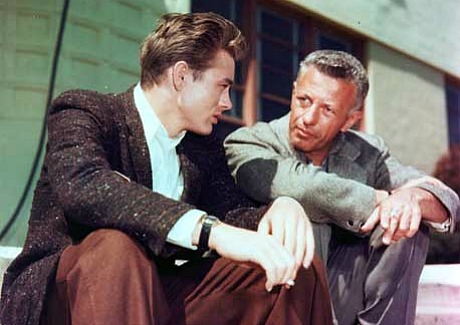
(l.) James Dean, (r.) Nicholas Ray during the making of Rebel Without A Cause in early 1955, when Ray was 44 or thereabouts.
If you want to be in good standing with the international elite film snob community, you have to be down with Ray’s films, just like you have to swear by the coded soap-opera kitsch of Douglas Sirk. This is a non-debatable clause in the contract. This is mainly because Ray was a highly skilled and passionate filmmaker, but primarily because Jean-Luc Godard once wrote that “Ray is cinema!,” or words to that effect.
My favorite Ray films have always been Rebel Without A Cause, In A Lonely Place, On Dangerous Ground and They Live By Night. Yes, I know — a boring thing to say. I’m sorry to offend the high priests of the temple but I hated Bigger Than Life when I saw it at the Film Forum a couple of years ago, and I’ve always been “meh” on Johnny Guitar.
Ever notice how the snobs never include Ray’s 55 Days at Peking or King of Kings in their retrospectives? Or mention them in their articles? That’s because they’re regarded as somewhat embarassing paycheck gigs and not “genuine” Ray films. But I kinda like 55 Days at Peking. Ray reportedly collapsed during shooting fo that Charlton Heston war-siege drama; the offshoot was that he had trouble finding work for a long time after.
My favorite Ray moment of the ’70s? When he kicks that paint can across the loft floor in The American Friend.
Favorite Ray anecdote: His walking in on wife Gloria Grahame while she was in bed with his 13 year-old son, Tony. 2nd favorite: his allegedly having had affairs with the 16 year-old Natalie Wood as well as James Dean while making Rebel. 3rd favorite: the story about Ray being bombed at Barney’s Beanery and without money and stuck for a ride home, allegedly sometime in the ’60s.
Swartz Solo
Earlier today Deadline‘s Mike Fleming reported that 42West partner Cynthia Swartz is “negotiaing her exit” to form her own p.r. shop. A source tells me rumors were making the rounds as early as last January that Swartz, a highly respected and admired Oscar-award campaign strategist, would be breaking off from 42West.
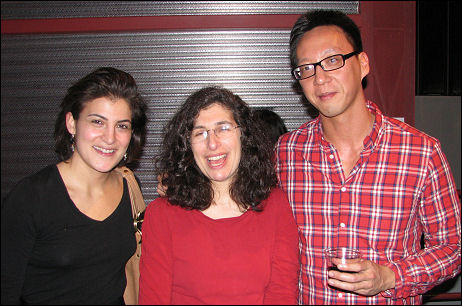
(l. to r.) Tribeca Film Festival’s Genna Terranova, 42 West partner Cynthia Swartz and IFC Films honcho Ryan Werner at March 2009 party for a “Focus on IFC Films” program at the Brooklyn Academy of Music.
Swartz’s new operation will be up and running fairly quickly, I’m hearing, and that she’ll be taking her 42West staff with her.
The only head-scratcher is why start a new business just as the Oscar season is about to kick in? Why wasn’t this decision made last winter or spring or at least a couple of months ago when Telluride/Toronto/Venice wasn’t breathing down everyone’s neck? In any event best of luck to a serious pro and one of the shrewdest publicists out there.
Tailspin
“A young woman I talked to at the airport last week said that she will not vote in the next election. I hate to hear that. I think if you don’t vote, you have no right to complain the next time around. You have voluntarily ceded your voice in this democracy. I told her that and she said, ‘After Obama, what is there left to hope for?'” — from Cenk Uygur‘s 8.9 firedoglake.com column, “Obama’s Tipping Point.”

